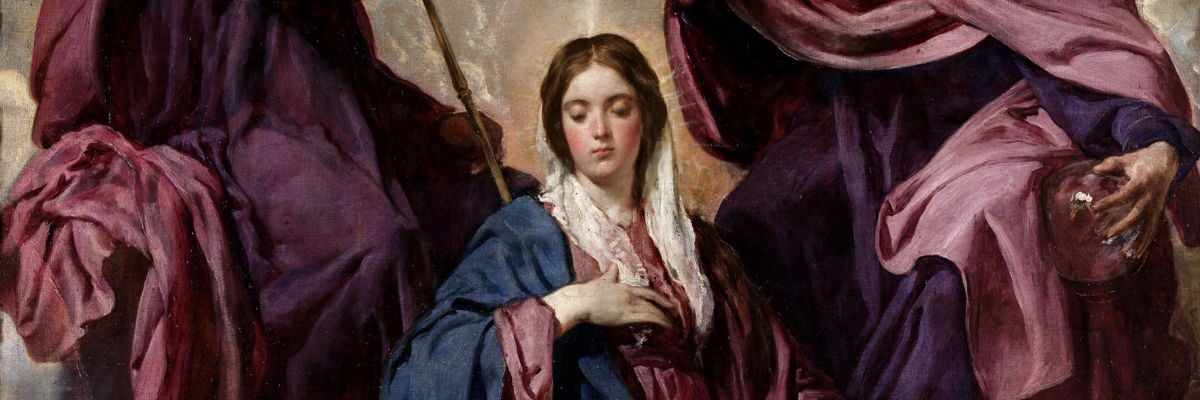
Joe Heschmeyer delves into the profound significance of the Rosary in honoring Mary and cultivating a deeper connection with Jesus. Discover how this ancient prayer practice invites contemplation, imitation, and a renewed appreciation for the divine mysteries.
Transcript:
How do Catholics honor Mary through the Rosary?
Yeah, so the idea of the Rosary, even the word Rosary is like Rose Garden. So it’s the idea of having a Marian sort of themed reflection on the life of Jesus. So if you go back to the Gospel of Luke, there are a couple times in the infancy narratives where we’re told that Mary pondered all these things in her heart.
And so one of the ways we want to honor Mary is by asking her for her prayers. And the other way we want to honor her is by imitating her and her contemplation of these divine truths.
And so you can see it really clearly in the joyful mysteries. She’s the first one to contemplate like what does the angel Gabriel mean in this enunciation or in the visitation? Strange things happen. Elizabeth greets her in very much the same words that David speaks of the Ark of the Covenant in 2 Samuel 6. And they’re both in the hill country of Judah for three months. And like what’s going on there? And then the mystery of the birth of Jesus and the presentation of the temple where more strange things happen. Simeon holds them up, you’ve got Anna the prophetess. And then the very strange encounter of the finding in the temple. And so for each of these joyful mysteries,
we sit with it for a little bit and we pray about it. And we try to come to a deeper understanding by pondering these things in our heart in the way that Mary does. And maybe we have a specific question we’re trying to sort out with it. Or maybe we’re just allowing the scene to be presented before our eyes so that we can just sort of chew on it. Without having any particular direction we’re trying to go, without having any particular inquiry we’re trying to get answered or request we’re trying to get, we’re just growing in a greater appreciation for these things we may have read and heard 10,000 times. But now we’re sitting with them and allowing them to speak to us in a new way. And so in that way, we’re honoring Mary by modeling the kind of discipleship that she shows us.
And imitating the model of discipleship, I should say, that she shows by pondering these things in her heart. That Mary is not someone who does a lot of talking, but she’s someone who does a lot of listening, contemplating, and then speaking when she feels the need. And that’s a good model for us in prayer to cultivate that attitude.
Okay, I was wondering on that because
I was actually raised Protestant and still working on trying to find my way back and staying.
But I’m still having a hard time understanding the honoring Mary, the rosary,
of praying to the saints.
Yeah, no, it’s a good question. I’m really glad that you’re asking.
One line that I’m often struck by is 2 Thessalonians chapter 1 verse 10, “When he shall come to be glorified in his saints, and to be made wonderful in all them who have believed.” There’s this notion that you’ll find sometimes in Protestantism that any kind of honor we give to Mary or the saints is going to take away honor from God. But Scripture thinks of it in just the opposite way, that God is made glorious in his saints. It’d be like saying,
there’s a great line in the movie Zoolander where he’s asked his favorite musician, and he says, “Sting.” He’s like, “I don’t listen to his music, but I really admire him for making it.” And there’s something so obviously ridiculous about that answer. And so likewise, to say that you honor the creator, but you need to avert your eyes from his creation, that’s not actually honoring him. If God truly is the creator and he is the sanctifier as well, then when we look at his creations that have been sanctified, he’s not threatened by that. We are celebrating in the work that he has done. And we’re celebrating in the work he has done precisely because he’s done it and he’s done a good job in it. So that’s what I would say there. If you find that sort of zero sum thinking that, “Oh no, any kind of honor I give to the works of art made by the artist is going to draw away from the honor due to the artist,” just recognize that that’s neither logically obvious nor is it biblically sound. It’s seemingly opposite, what Scripture says in places like 2 Thessalonians 1.10.
Hey, thanks for watching. If you like this Catholic answer, be sure to like, subscribe, and check out our live streams Monday through Friday, 3 to 5 p.m. Pacific, or find the episode after on YouTube, your favorite podcast platform or our Catholic Answers app.



